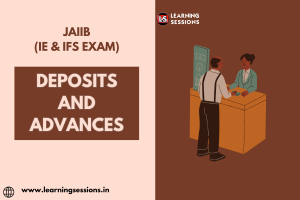Unravel the door to an outstanding banking career with our JAIIB courses, where we explore the vital concepts of deposits and advances within the Indian economy (IE) and the Indian financial system (IFS). Join us at Learning Sessions to become a part of the developing financial landscape, where you can contribute to economic development and make a meaningful impact in the banking sector.

📚 JAIIB Study Resources 📚
👉 Check Here
👉 Check Here
👉 Check Here
👉 Get Tests Here
👉 Check Here
DOWNLOAD PDF DEPOSIT AND ADVANCES -CASE STUDY
Deposits are funds placed by individuals, businesses, and institutions with a bank for safekeeping. Banks act as guardian of these deposits and offer interest on certain types of deposits. These funds become the primary source of funds that banks use to lend to borrowers in the form of advances.
For the extensive preparation of candidates, get details through our YouTube videos for JAIIB IE & IFS Module wise Syllabus with explanations and tips to help candidates in their preparation journey.
You may also like these JAIIB case studies:
JAIIB | IE & IFS | LATER STAGE FINANCING
JAIIB | IE & IFS | EARLY STAGE FINANCING
Types of Deposits in India:
- Demand Deposits
- Time Deposits
- Recurring Deposits (RD)
- Savings Accounts
Advances refer to loans or credit provided by banks to individuals, businesses, or industries to meet their financial needs. Advances are a crucial driver of economic activity, enabling investment, consumption, and the creation of jobs and wealth.
Types of Advances in India:
- Term Loans
- Cash Credit (CC)
- Overdraft (OD)
- Demand Loans
- Bills Discounting
Taking everything into account, Deposits and Advances form the foundation of the Indian banking system, playing a critical role in financial intermediation, economic growth, and financial inclusion. For JAIIB candidates, comprehending how banks manage deposits and advances is dominant to grasping the larger dynamics of the Indian economy (IE) and Indian financial system (IFS). Banks must maintain a fine stability between the two, ensuring sufficient liquidity, minimizing risks, and supporting economic development. By extending credit to businesses and individuals, banks not only generate profits but also contribute to broader economic objectives such as jobs. Learning Sessions provides additional information about JAIIB IE & IFS PARA BANKING by giving examples of real life scenarios.
Learn more about this case study through our YouTube channel and PDF.
Get access to our Telegram Channel for free Pdfs of JAIIB.
You May also Find these JAIIB Posts Useful
BANKING REGULATION (BR) ACT 1979





